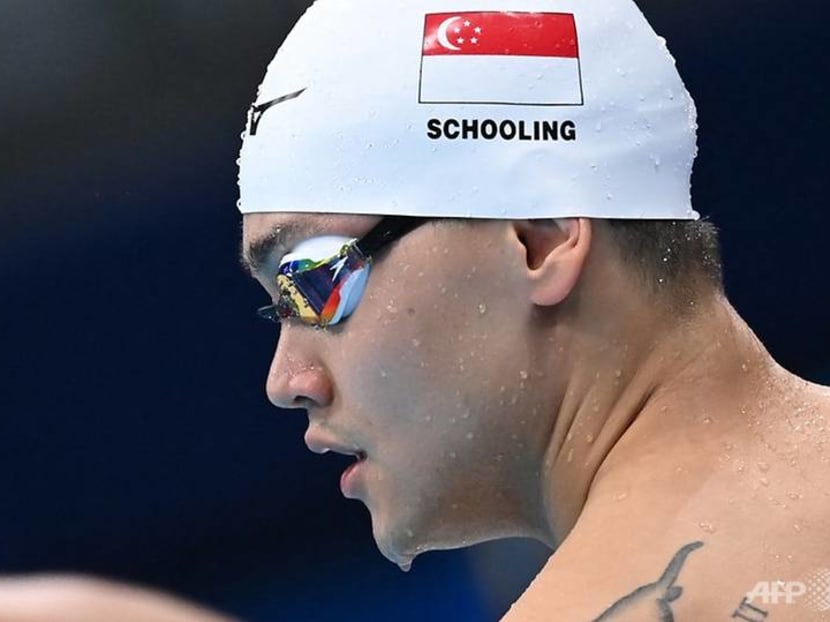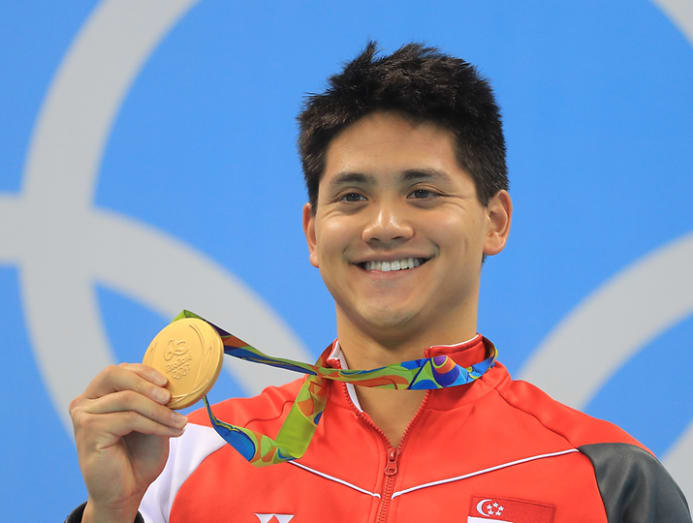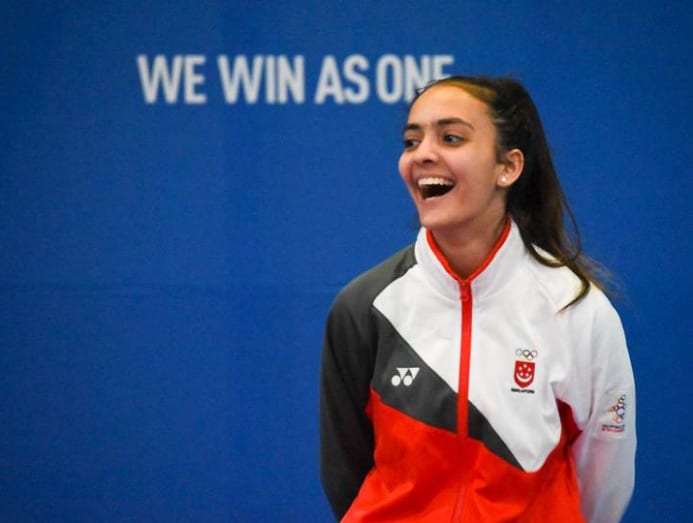Commentary: We need to talk about why Joseph Schooling crashed in Tokyo
After our emotions have calmed, perhaps we can finally dissect how things went badly at the Tokyo 2020 Olympics 100m men’s butterfly heats, says CNA 938’s Gerard Wong.

Singapore's Joseph Schooling at the Tokyo Aquatics Centre during the Tokyo Olympics. (Photo: AFP/Jonathan Nackstrand)
SINGAPORE: One day, maybe a few months down the road, or even a year, when all the dust has finally settled, and the race becomes just another memory, I hope we can get a no-holds-barred assessment from Joseph Schooling about his journey to the 2020 Tokyo Olympics.
We all know what happened in Tokyo on Thursday (Jul 29).
Our reigning Olympic champion took part in the men’s 100m butterfly heats. Less than 54 seconds later, he was no longer the reigning champ.
Schooling clocked 53.12s. He was last in his heat. His time was almost three seconds slower than his Olympic record of 50.39s.
He eventually ranked 44th out of 55 swimmers. China's Sun Jiajun took the 16th and final semi-final spot with his time of 51.74s.
Judging from social media, Singaporeans are divided over the result. Keyboard warriors have been out in full force, hurling all sorts of invective and hurtful words.
Joe's supporters have hit back at the detractors. Former athletes have also chimed in.
READ: 'They are doing their best': President Halimah calls for support for athletes after Schooling Olympic exit
They say people who have not competed at elite level, who have never won medals, have no right to criticise any of our athletes, much less our Olympic champ.
WE PROBABLY SAW THIS COMING
But are you surprised Schooling didn't make the final? I'm not.
After the euphoria of winning gold in 2016, the manner of his exit on Thursday left me feeling more deflated than anything else.
However, if you have been tracking Schooling's performances and timings over the past four years after the Rio Games, you could have seen this coming.
In 2017, the first threat to his title defence emerged at the World Championships. That was where Caeleb Dressel first announced his arrival on the world stage.
The American clocked 49.86s in the 100m butterfly final. Hungary’s Kristof Milak came after him in 50.62s. Schooling was third in 50.83s.
And since then, Schooling's times have been regressing. He won gold at the 2018 Asian Games in 51.04s. At the 2019 FINA World Championships, he clocked 52.93s in the heats and didn't qualify for the semi-finals. He was 24th out of 77 swimmers.

At the 2019 SEA Games, he finally clawed back to win gold in 51.84s.
But this year, at the ISCA International Senior Cup in Florida in March, Schooling clocked 52.93s again to finish second behind Dressel, who cruised in at 51.69s.
And so this much was clear as we approached the Olympics - Schooling was not going to win a medal, much less successfully defend his gold.
READ: 'They are doing their best': President Halimah calls for support for athletes after Schooling Olympic exit
Perhaps, our sports officials knew it too but chose to be diplomatic.
At a press conference before the Olympics in early July, Singapore Sports Institute chief Toh Boon Yi said there were no medal targets for Schooling or any of Singapore's contingent.
"Joseph has already made history and this is something that nobody can take away from him," said Toh. "He will go down in history as that young man that won Singapore's first gold medal."
DON’T LEAVE THINGS AS THEY ARE
Yet, now that the race is over, and reality has sunk in, we shouldn't - and we can't - leave things as they are.
Let's rise above the sound and fury of the shaming and counter-shaming in social media. But let’s also address the elephant in the room at some point.
We need to find out why Schooling's times have never improved since the 2016 Rio Games, and why they have been going downhill since.
Doing so may actually help us to glean some important lessons that could benefit Singapore's future elite athletes.
This is not fault-finding but attempting to get at the root of it all. Because surely this is not the sort of trajectory that one expects from a world-class athlete who was so young - 21 - when he won the Olympic gold.
Here's an example: Malaysian badminton star Lee Chong Wei, now retired, stayed at the top of the world rankings for 199 consecutive weeks from 2008 to 2012.
READ: Commentary: Jo Schooling, a hunted man on a quest for gold and so much more
He also won the Olympics men's singles silver medal thrice from 2008 to 2016. That's consistency on a world-class level, no?
Here’s another example: At the 1988 Seoul Olympics, Anthony Nesty of Suriname shocked the world by winning the 100m butterfly. It was, and still remains Suriname's only gold medal.
Nesty then stayed unbeaten in the event for three years after that, before eventually finishing third at the 1992 Barcelona Games.
And so what happened with Schooling? Why did his times go the other way? And why couldn't he reverse them, no matter what he tried doing?
Was it because he had to leave the University of Texas in 2018 to return to Singapore after graduation?
Texas is one of the kings of swimming at the National Collegiate Athletic Association (NCAA) or collegiate level and it provided Schooling the platform to constantly train with and compete against some of the best swimmers in the US.
So, was it because Singapore could not provide the same level of intensive training and competition? Let's face it - he was the only Olympic champion training alongside SEA Games-level teammates.
Was that why he had to return to the US in February last year to reunite with his former coach Sergio Lopez, who is coaching at Virginia Tech University?
Or did life, with all its attractions, challenges and pitfalls, start getting in the way for Schooling after his Rio triumph, after all those years of cocooned disciplined and intensive training in Florida, and then in Houston, that paved the way for his Olympic glory?

Hopefully, Schooling will give us an unvarnished account one day, warts and all, when he is ready. But knowing the facts, a dispassionate deep dive into his experiences, trials and tribulations from Rio to Tokyo is important because these answers could help Singapore continue nurturing, developing and protecting our future elite athletes.
READ: Commentary: Toned-down Tokyo Olympics opening ceremony can set new standard for future games
One such athlete is fencer Amita Berthier.
She's a former world junior number one. She's won a Junior World Cup title. She's 20 and studying at the University of Notre Dame.
She also became the first Singaporean fencer to qualify for the Olympics, and she lost in the Round of 32 to former world number one Lee Kiefer who went on to win the gold.
What lessons can we glean from Schooling's experience these past five years that will help Amita to become an Olympic medal hope after she graduates from Notre Dame?
PROVE US WRONG
Does it look like Schooling's time at the highest levels of elite swimming is probably over?
It pains me to even think about it. With age not on his side, reducing the three-to-four second gap that stands between him and younger rivals like Dressel and Milak is going to be a very tough task.
I would love for him to prove me wrong.
But first, I’m looking forward to what he might reveal when the dust has finally settled on his Tokyo Olympics campaign.
Gerard Wong is a senior editor with CNA938. He is also the former sports editor at TODAY, where his team covered the 2016 Rio Olympics.





